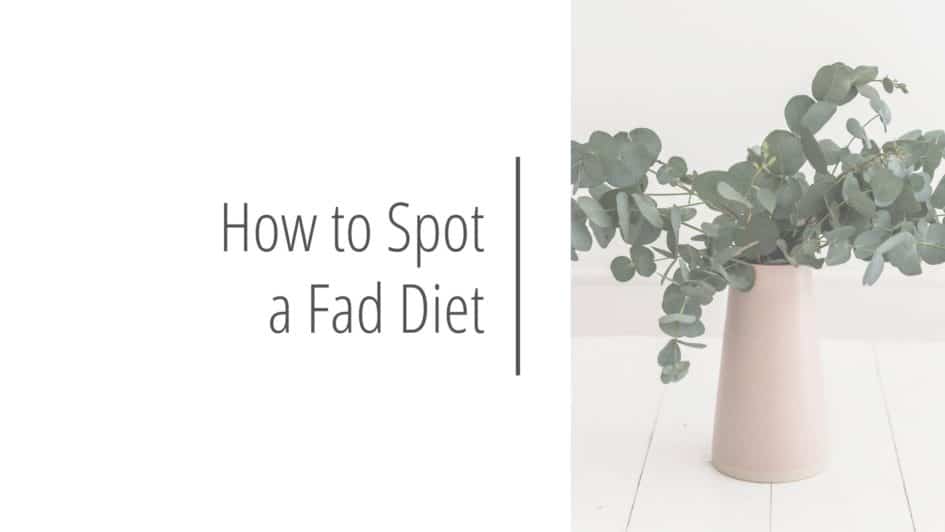Table of Contents
What is a Fad Diet?
Before we can learn how to spot fad diets, it’s important to know exactly what a fad diet is. If you are unfamiliar with the term, here are a couple of ways Google defines the term fad diet.
- A diet that involves eliminating foods that contain necessary nutrients and sometimes cutting out entire food groups
- A stylish weight loss plan that promises dramatic results
- A diet that is popular for a time, similar to fads in fashion
- Any of a number of weight-reduction diets that either eliminate one or more of the essential food groups or recommend consumption of one type of food in excess at the expense of other foods
- A diet that rarely follows sound nutritional principles
- A diet that makes weight loss seem easy and quick
Are Fad Diets Harmful?
The short answer? Yes. The long answer? Also, yes. This makes learning how to spot a fad diet very important.
Fad diets exist because society has taught us that we need to change our bodies. Society has ingrained in us that the less we weigh and the skinnier we are, the more beautiful and valued we are. Fad diets act as a quick solution to this problem.
Fad diets harm our relationship with food. This is done by demonizing certain nutrients such as carbohydrates or fat. This makes it seem as though these nutrients will cause us harm or make us bad people when we eat them. This thinking leads to avoidance, guilt, shame, and disordered eating patterns.
Fad diets promise quick weight loss, which will most likely lead to weight regain. Not only is this harmful to our self-esteem, but it’s harmful to our bodies. Weight cycling can cause a serious disruption in our body’s metabolic rate and promote poor cardiovascular health.
Fad diets can lead to deficiencies or abnormalities within the body. For example, the Keto Diet, a popular fad diet, focuses on a low carbohydrate, high protein intake. Diets like this are often high in butter, meat, eggs, cheese, and poultry. The majority of these foods are high in fat, specifically saturated fat, which can increase bad cholesterol and triglycerides while also increasing the risk of heart disease and type 2 diabetes. However, Keto is just one example of how fad diets can cause harm to our bodies.
Common Fad Diets
One easy way to spot a fad diet is to familiarize ourselves with the most common/popular ones.
- Keto diet, also known as the ketogenic diet, the Atkins diet, the low-carb diet, or South Beach Diet
- Whole 30
- Paleo Diet
- Alkaline Diet
- Cleanses or detoxes
- Weight Watchers, now known as WW
- Kurbo for Kids by WW
- Don’t ever put a child on a diet. Just do not do it.
- Raw food diet
- Intermittent fasting
- Gluten-free diet
- Unless you have Celiac Disease, of course
- Juicing diets
- Meal replacement shakes
- Elimination diets
- Unless you have diagnosed IBS or other similar condition
- Liquid diet
- Macrobiotic diet
- Blood type diet
- Sugar alcohol diets
- Sugar-free diets
- and the list goes on…
Fad Diet Clues to Look For
Some of the fad diets mentioned above can be found under different names and some diets simply don’t have a name. Here are some easy tips and trips to keep in mind for how to spot fad diets that are tricky to identify.
- Does it promote a quick fix?
- Does it restrict or exclude certain food groups or nutrients?
- Does it promote that one food can fix your problem(s)?
- Does it promote restrictive habits or have rigid rules?
- Does it promote intentional weight loss?
- Does it sound too good to be true?
- Does it sound just straight-up crazy?
- Is it sold by a celebrity, influencer, or friend on social media?
- Does it label foods as good or bad?
- Does it specify when or when not to eat food(s)?
- Does it demonize certain nutrients or molecular components of food?
- Does it guarantee a “perfect” body or a toned body as a result?
- Does it have little or no scientific evidence to back it up?
- A handful of scientific articles does not count as evidence-based or scientifically proven
- Correlation does not equal causation
- Does it make claims based on customer testimonies?
- Does it claim that it can heal an illness, such as an autoimmune disease or cancer?
- Does it involve taking some form of a supplement?
- Does it claim to boost the body’s fat-burning abilities?
- Does it claim to boost the body’s metabolism or metabolic rate?
- Does it claim to magically make you feel more energetic?
Quick Summary
Fad diets promote quick results and weight loss with a side of disordered eating. Fad diets promote unattainable beauty standards, harm our relationship with food, promote quick unsustainable fixes, and increase nutrient deficiencies and body abnormalities. Knowing how to spot a fad diet is important to our overall well-being.
There are two simples ways to identify a fad diet:
- Know the names of the most common and popular fad diets
- Know how to spot fad diets that don’t necessarily have a name by identifying what the diet promotes and promises
Learning how to spot fad diets is such a crucial step in any anti-diet journey. To further your anti-diet knowledge, check out my posts about Intuitive Eating, body positivity, Health at Every Size (HAES), and all things anti-diet. You can also check out my anti-diet themed store for fun products that aim to dismantle diet culture!
Thanks for reading!
Rachel Beiler, MHS, RD, LDN


1 Pingback